Saturday, December 1, 2018
National Public Radio
 | |
| Soros Money? |
Contents[hide] |
History
NPR was incorporated in 1970, taking over the National Educational Radio Network. NPR hit the airwaves in April 1971, with coverage of the United States Senate hearings on the Vietnam War. The next month, All Things Considered debuted, hosted by NPR founder Robert Conley. NPR was merely a production and distribution organization until 1977, when it merged with the Association of Public Radio Stations. As a membership organization, NPR was now charged with providing stations with training, program promotion, and management; representing public radio before Congress; and providing content delivery mechanisms such as satellite delivery.NPR suffered an almost fatal setback in 1983, when an attempt to expand its services backfired, and the company found itself nearly seven million dollars in debt. After a congressional investigation and the resignation of NPR's president, the Corporation for Public Broadcasting agreed to loan the network money to stave off bankruptcy.[1] In exchange, NPR agreed to a new arrangement whereby its annual CPB stipend would be divided among local stations instead, which would then support NPR productions on a subscription basis. NPR also agreed to turn its satellite service into a cooperative venture, making it possible for non-NPR shows to get national distribution. It took NPR another three years to pay off all its debt.[2]
Governance
NPR is a membership corporation. Member stations are required to be noncommercial or educational radio stations, have at least five full-time professional employees, operate for at least 18 hours per day, and not be designed solely to further a religious philosophy or be used for classroom programming. Each member station receives one vote at the annual NPR board meetings—exercised by its designated Authorized Station Representative (A-Rep).To oversee the day to day operations and prepare its budget, members elect a Board of Directors. This board is comprised of ten A-Reps, five members of the general public, and the chair of the NPR Foundation. Terms last for three years and rotate such that some stand for election every year.
The original "purposes" of NPR,[3] as ratified by the board of directors, are:
- Provide an identifiable daily product which is consistent and reflects the highest standards of broadcast journalism.
- Provide extended coverage of public events, issues and ideas, and to acquire and produce special public affairs programs.
- Acquire and produce cultural programs which can be scheduled individually by stations.
- Provide access to the intellectual and cultural resources of cities, universities, and rural districts through a system of cooperative program development with member public radio stations.
- Develop and distribute programs for specific groups (adult education, instruction, modular units for local productions) which may meet needs of individual regions or groups, but may not have general national relevance.
- Establish liaison with foreign broadcasters for a program exchange service.
- Produce materials specifically intended to develop the art and technical potential of radio.
Funding
The NPR web site offers annual reports, IRS 990 forms, and audited financial statements. According to the most recent 2005 financial statement, NPR makes just over half of its money from the fees and dues it charges member stations to receive programming, although some of this money originated at the CPB itself, in the form of pass-through grants to member stations. About two percent of NPR's funding comes from government grants and programs (chiefly the Corporation for Public Broadcasting); the remainder comes from member station dues, foundation grants, and corporate underwriting. Typically, NPR member stations raise about one-third of their budget through on-air pledge drives, one-third from corporate underwriting, and one-third from grants from state governments, university grants, and grants from the CPB itself.The two percent figure above refers only to money contributed by the federal government directly to NPR. Additional government money makes its way to NPR indirectly. This is because the government (again chiefly the Corporation for Public Broadcasting) provides some funding to NPR member stations, the states (and via the states' state universities) in addition to the funding provided to NPR itself. Since these member stations contribute to NPR (in the form of dues and programming fees), the federal government's portion of NPR's budget is significantly higher than two percent, and the total government expenditure is higher still.
Over the years, the portion of the total NPR budget that comes from government has decreased. During the 1970s and early 1980s, the majority of NPR funding came from the government. Steps were being taken during the 1980s to completely wean NPR from government support, but the 1983 funding crisis forced the network to make immediate changes. More money to fund the NPR network was raised from listeners, charitable foundations, and corporations, and less from the government.
Underwriting spots vs. commercials
In contrast to commercial radio, NPR does not carry traditional commercials, but has advertising in the form of brief statements from major donors, large business corporations. These statements are called underwriting spots, not commercials, and, unlike commercials, are governed by FCC restrictions; they cannot advocate a product or contain any "call to action." Critics of NPR have complained that describing public radio as "commercial free" is "transparently false."[4] In 2005, corporate sponsorship made up 23 percent of the NPR budget.[5] Since NPR is not as dependent on revenue from underwriting spots as commercial stations are on revenue from advertising, its programming decisions may be less ratings-driven. Nevertheless, some listeners have stopped listening to NPR member stations due to NPR underwriting statements.[6]Joan Kroc Grant
On November 6, 2003, NPR was given over $225 million from the estate of the late Joan B. Kroc, widow of Ray Kroc, founder of McDonald's Corporation. This was a record—the largest monetary gift ever to a cultural institution.[7] For context, the 2003 annual budget of NPR was $101 million. In 2004 that number increased by over 50 percent to $153 million due to the Kroc gift, as the bequest required that $34 million be spent to shore up operating reserves.[8] NPR has dedicated the earnings from the remainder of the bequest to expanding its news staff and reducing some member stations' fees. The 2005 budget was about $120 million.Production facilities and listenership
NPR's major production facilities have been based in Washington, D.C. since its creation. On November 2, 2002, a West Coast production facility, dubbed NPR West, opened in Culver City, California. NPR opened NPR West to improve its coverage of the Western United States, to expand its production capabilities (shows produced there include News & Notes and Day to Day), and to create a fully functional backup production facility capable of keeping NPR on the air in the event of a catastrophe in Washington, D.C.According to a 2003 Washington Monthly story, about 20 million listeners tune into NPR each week. On average they are 50 years old and earn an annual income of $78,000. Its audience is predominantly white; only about 10 percent are either African American or Hispanic. Many of its listeners consider NPR to be at the apex of journalistic integrity.
From 1999 through 2004, listenership has increased by about 66 percent. This increase may have been the result of any of a number of factors, including audience interest in coverage of the September 11 terrorist attacks and the subsequent military actions, a general lack of interest in other terrestrial radio outlets, and an increase in NPR news and talk programming (instead of jazz or classical music). NPR attracted these new listeners at the same time that the size of the overall radio audience in the United States was decreasing rapidly as people abandoned the medium in favor of digital audio players.
In recent years, NPR has made some changes to appeal to younger listeners and to minority groups. From 2002 until 2004, Tavis Smiley hosted a show targeted towards African Americans, but left the network, claiming that the organization did not provide enough support to make his production truly successful. Smiley did return to public radio in April 2005, with a weekly show distributed by Public Radio International (PRI). NPR stations have long been known for carrying European classical music, but the amount of classical programming carried on NPR stations and other public radio outlets in the U.S. has declined. Many stations have shifted toward carrying more news, while others have shifted to feature more contemporary music that attracts a younger audience.
Criticism
Liberal bias
Many conservative Republicans have alleged that the network tailors its content to the preferences of an audience drawn from a liberal "educated elite." While members of NPR's audience are more likely to be college educated than those who listen to other radio outlets, Fairness and Accuracy in Reporting, a self-labeled "progressive"[9] media watchdog group, disputes the claim of a liberal bias.[10] A study conducted by researchers at the University of California-Los Angeles and the University of Missouri found that while NPR is "often cited by conservatives as an egregious example of a liberal news outlet," "[b]y our estimate, NPR hardly differs from the average mainstream news outlet. Its score is approximately equal to those of Time, Newsweek, and U.S. News & World Report and its score is slightly more conservative than the Washington Post's."[11]Liberal critics have alleged that NPR caters to its corporate funders and shies away from controversial topics. Many of them believe that NPR avoids the sort of journalism that would embarrass companies that are large, private donors to NPR programming. In addition to the perception of avoiding direct criticism of corporate sponsors, NPR has had very real threats of funding cuts, especially while Republicans led the House of Representatives.
Supporters contend that NPR does its job remarkably well. A study conducted in 2003 by the polling firm Knowledge Networks and the University of Maryland’s Program on International Policy Attitudes showed that those who get their news and information from public broadcasting (NPR and PBS) are better informed than those whose information comes from other media outlets, including cable and broadcast TV networks and the print media. In particular, 80 percent of Fox News[12] viewers held at least one of three common misperceptions about the war in Iraq; only 23 percent of NPR listeners and PBS viewers were similarly misinformed.[13]
Pelosi, Schumer expected to meet with Trump amid battle over border funding
Sen. Chuck Schumer and U.S. Rep. Nancy Pelosi will meet with President Trump next week, Fox News has learned.
(Associated Press)
Democratic leaders Nancy Pelosi and Chuck Schumer will meet with President Trump next week, Fox News has learned, as the Democratic Party prepares to regain control of the House and likely bring greater scrutiny to Trump’s agenda.
The meeting between is expected to take place Tuesday morning.
A list of possible topics has not been released, but year-end appropriations to fund several departments, including Homeland Security, Housing and Uran Development and the Justice Department, will most likely be discussed, as the Dec. 7 deadline approaches to avoid a partial government shutdown.
Schumer, the Senate minority leader from New York, blames Trump for holding up spending talks, as tensions heat up over border security spending.
“Seven bipartisan appropriations bills are hanging in the balance for one reason and one reason only: President Trump,” Schumer said on the Senate floor, according to Politico.
Funding for Trump’s border wall could be a key topic at Tuesday's meeting. The president has asked Congress to provide $5 billion for the project, much higher than what Democrats are willing to support.
Congress has already allocated $1.3 billion.
In January, the House will fall back into Democratic control. On Wednesday, Pelosi, D-Calif., was nominated by her party to serve another stint as speaker in a 203-32 vote.
Those numbers leave her short of the 218 she needs to win the post. An official vote is expected to occur in January.
Pelosi previously held the position from 2007 to 2011. But several Democrats have said the party needs a new leadership, citing Pelosi as a divisive figure who's often attacked by Republicans.
Several newly elected Democrats campaigned on promises to not support her reappointment as speaker.
On Wednesday, Pelosi said she expected any opposition against her to eventually erode.
“I think we’re in pretty good shape,” she said. “I don’t want to make other people’s announcements for them, but we go forward with confidence and humility.”
Alaska Republican wins House race by 1 vote after recount -- but expects Democrat to challenge results
Bart LeBon, a GOP candidate for the Alaska House District 1
seat in Fairbanks, won a recount by one vote, according to reports.
(Eric Engman/Fairbanks Daily News-Miner via AP, File)
Every
vote counts, they say -- and that was never more true than on Friday in
Alaska, where a Republican won a U.S. House race by a single vote
following a recount.
On a day that Alaskans were primarily focused on a frightening earthquake that caused considerable damage,
Republican Bart LeBon, a retired banker, defeated Democrat Kathryn
Dodge by a single vote after both were previously tied with 2,661 votes
each.
Following the recount, LeBon gained two extra votes, while Dodge got one additional vote, making LeBon the victor.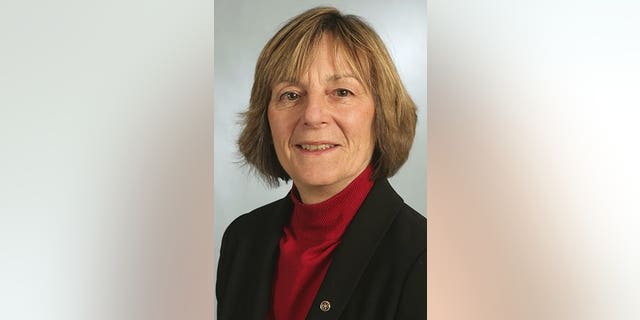
Kathryn Dodge, a Democrat, was tied with Republican Bart LeBon in an election for a U.S. House seat in Alaska.
(Sam Harrel/Fairbanks Daily News-Miner via AP, File)
The election had its share of controversy. Before the recount, a mystery ballot was found weeks ago on the table in a voting precinct, potentially determining the fate of the election. In the end, it wasn’t counted because it turned out to be a spoiled ballot by a voter who made a mistake on it.
If LeBon’s victory is certified, Alaska will become a single-party state with the GOP holding the House, Senate and governor’s office.
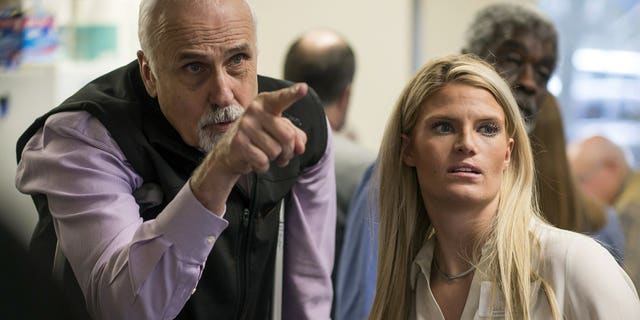
Alaska House District 1 candidate Republican Bart LeBon points to a
vote tally board with his campaign manager Brittany Hartmann during a
election recount at the Department of Elections' Juneau office on
Friday, Nov. 30, 2018.
(Michael Penn/Juneau Empire via AP)
The Democrat still has five days to appeal the election outcome to the state Supreme Court. It remains unclear if her campaign is seriously considering the challenge.
“People kept calling it close,” Dodge once said of the race. “I just didn’t know it was going to be squeaky.”
But the Republican believes the election and the ballot counting that lasted for three weeks is far from over, saying he expected a legal challenge from whoever loses the recount.
“I’m pretty sure this has got another layer to it,” he said. “I would be thrilled if it was over, but is this over? I just don’t think so.”
If the Democrat decides to pursue a legal action and the new recounts puts the two candidates at a tie, the winner would be decided by a coin toss.“I’m pretty sure this has got another layer to it. I would be thrilled if it was over, but is this over? I just don’t think so.”— Republican Bart LeBon
The current state House speaker, Democrat Bryce Edgmon, won his 2006 primary election after a coin toss.
He said the practice of deciding the winner through a coin toss is “not something I would wish for anybody to go through.”
False claim of Trump Jr. legal jeopardy forces NPR to issue correction
NPR was forced to issue a lengthy correction on Friday after
falsely accusing Donald Trump Jr. of lying to the Senate about the plans
to build a Trump Tower in Moscow, claiming his statements contradict
with Michael Cohen’s plea deal with the Special Counsel.
(Associated Press)
NPR was forced to issue a lengthy correction Friday after falsely accusing Donald Trump Jr. of lying to the Senate about plans to build a Trump Tower in Moscow, claiming his statements contradicted Michael Cohen’s plea deal with Special Counsel Robert Mueller.
The public radio network, which receives federal funds, used Trump Jr.’s Senate testimony transcript from 2017 to report that he said the Trump Organization’s possible real estate deal in Russia “faded away” by the end of 2014.
The eldest son of President Trump then denied the deal was being discussed in 2016.
“There was never a definitive end to it. It just died of deal fatigue,” he told the Senate.
This answer, according to NPR, placed Trump Jr. in serious legal jeopardy because Cohen said in a plea agreement earlier this week that he continued working on the deal through June 2016 and he even told the president and his children about it.
But critics claimed that NPR rushed the story, overlooking other answers by Trump Jr. that show he admitted the Trump Tower Moscow was being discussed in 2016.
“It’s been reported that in late 2015 or 2016 when now-President Trump was running for office the Trump Organization was pursuing a plan to develop a massive Trump Tower in Moscow. Is that accurate?” Trump Jr. was asked by the Senate.
"Yes," came his reply.
Five hours later after publishing the article on its website, NPR issued a correction -- though it didn’t fully retract the article, admitting only that it “mischaracterized” Trump Jr.'s answers.
“An earlier version of this report mischaracterized an answer Donald Trump Jr. gave to Senate investigators in 2017 about the prospective projects his family was negotiating with people in Moscow,” the editor’s note read.
“Trump Jr. did acknowledge in his testimony that Cohen and another man were exploring a possible deal in Moscow in 2015 or 2016,” the correction added.
Trump Jr. celebrated the correction in a series of tweets. “I guess this is as close as I’ll get to an apology where yet another ‘bombshell’ bites the dust,” he wrote in a tweet. “Pro tip: don’t just rush to publish anything thinking that it’s the got ya you so desperately want it to be. CNN has the market cornered on that... let them own it.”
Despite the massive error, the NPR story attracted attention from a number of Democratic lawmakers, including U.S. Sen. Patrick Leahy of Vermont and U.S. Rep. Eric Swalwell of California, who have not yet deleted their misleading tweets.
“A good lesson for all kids (and for anyone in the White House): the truth always comes out,” Swalwell tweeted.
CNN BOTCHES DATES, INACCURATELY REPORTS TRUMP CAMPAIGN HAD WIKILEAKS SNEAK PEEK
It was at least the second time Trump Jr. was the subject of botched reporting. CNN’s now-debunked story last year claimed the president’s eldest son had a sneak peek at hacked information that WikiLeaks had acquired.
The liberal network claimed an email was sent to Trump Jr. and Trump campaign associated a week before WikiLeaks posted the information publicly.
But it turned out that CNN got the date of the email wrong and it was actually sent a day after WikiLeaks already published the information, prompting the network to issue a correction that effectively retracted the article.
NPR was forced to issue a lengthy correction Friday after falsely accusing Donald Trump Jr. of lying to the Senate about plans to build a Trump Tower in Moscow, claiming his statements contradicted Michael Cohen’s plea deal with Special Counsel Robert Mueller.
The public radio network, which receives federal funds, used Trump Jr.’s Senate testimony transcript from 2017 to report that he said the Trump Organization’s possible real estate deal in Russia “faded away” by the end of 2014.
The eldest son of President Trump then denied the deal was being discussed in 2016.
“There was never a definitive end to it. It just died of deal fatigue,” he told the Senate.
This answer, according to NPR, placed Trump Jr. in serious legal jeopardy because Cohen said in a plea agreement earlier this week that he continued working on the deal through June 2016 and he even told the president and his children about it.
But critics claimed that NPR rushed the story, overlooking other answers by Trump Jr. that show he admitted the Trump Tower Moscow was being discussed in 2016.
“It’s been reported that in late 2015 or 2016 when now-President Trump was running for office the Trump Organization was pursuing a plan to develop a massive Trump Tower in Moscow. Is that accurate?” Trump Jr. was asked by the Senate.
"Yes," came his reply.
Five hours later after publishing the article on its website, NPR issued a correction -- though it didn’t fully retract the article, admitting only that it “mischaracterized” Trump Jr.'s answers.
“An earlier version of this report mischaracterized an answer Donald Trump Jr. gave to Senate investigators in 2017 about the prospective projects his family was negotiating with people in Moscow,” the editor’s note read.
"An earlier version of this report mischaracterized an answer Donald Trump Jr. gave to Senate investigators in 2017 about the prospective projects his family was negotiating with people in Moscow."The outlet went on to acknowledge that Trump Jr.’s remark about the deal that fell apart in 2014 referred to a different set of negotiations and not the ones to which Cohen was referring.
— NPR
“Trump Jr. did acknowledge in his testimony that Cohen and another man were exploring a possible deal in Moscow in 2015 or 2016,” the correction added.
Trump Jr. celebrated the correction in a series of tweets. “I guess this is as close as I’ll get to an apology where yet another ‘bombshell’ bites the dust,” he wrote in a tweet. “Pro tip: don’t just rush to publish anything thinking that it’s the got ya you so desperately want it to be. CNN has the market cornered on that... let them own it.”
Despite the massive error, the NPR story attracted attention from a number of Democratic lawmakers, including U.S. Sen. Patrick Leahy of Vermont and U.S. Rep. Eric Swalwell of California, who have not yet deleted their misleading tweets.
“A good lesson for all kids (and for anyone in the White House): the truth always comes out,” Swalwell tweeted.
CNN BOTCHES DATES, INACCURATELY REPORTS TRUMP CAMPAIGN HAD WIKILEAKS SNEAK PEEK
It was at least the second time Trump Jr. was the subject of botched reporting. CNN’s now-debunked story last year claimed the president’s eldest son had a sneak peek at hacked information that WikiLeaks had acquired.
The liberal network claimed an email was sent to Trump Jr. and Trump campaign associated a week before WikiLeaks posted the information publicly.
But it turned out that CNN got the date of the email wrong and it was actually sent a day after WikiLeaks already published the information, prompting the network to issue a correction that effectively retracted the article.
George H.W. Bush, 41st president of the United States, dead at 94
Former President George H.W. Bush, who spent a lifetime in public service and as the nation's leader scored a decisive victory over Saddam Hussein but battled a faltering economy, died Friday at age 94.
Family spokesman Jim McGrath said Bush died shortly after 10 p.m. Friday, about eight months after the death of his wife, Barbara Bush.
He is survived by five children, including former President George W. Bush and former Florida Gov. Jeb Bush. A sixth child died in early childhood. The late former president also is survived by 17 grandchildren.
Former President George W. Bush issued the following statement upon his father's death:
"Jeb, Neil, Marvin, Doro, and I are saddened to announce that after 94 remarkable years, our dear Dad has died. George H.W. Bush was a man of the highest character and the best dad a son or daughter could ask for. The entire Bush family is deeply grateful for 41's life and love, for the compassion of those who have cared and prayed for Dad, and for the condolences of our friends and fellow citizens."
President Trump, who is in Argentina attending the G-20 summit, also issued a statement on behalf of himself and first lady Melania Trump. It read in part:
"Melania and I join with a grieving Nation to mourn the loss of former President George H.W. Bush, who passed away last night.
"Through his essential authenticity, disarming wit, and unwavering commitment to faith, family, and country, President Bush inspired generations of his fellow Americans to public service — to be, in his words, “a thousand points of light” illuminating the greatness, hope, and opportunity of America to the world."
George H.W. Bush
was known for his gentlemanly demeanor, dedication to traditional
American values, willingness to take on foreign despots like Iraq's
Hussein and Panama's Manuel Noriega, and presiding over the breakup of
the Soviet Union."Through his essential authenticity, disarming wit, and unwavering commitment to faith, family, and country, President Bush inspired generations of his fellow Americans to public service — to be, in his words, “a thousand points of light” illuminating the greatness, hope, and opportunity of America to the world."
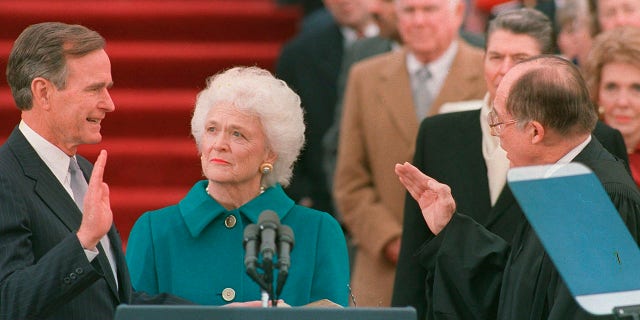
In childhood, he was nicknamed "have half" for his generosity in offering other youngsters half of whatever he had. After leaving office, he was often referred to as "41" – shorthand for his status as America's 41st president and to distinguish him from his son and fellow president, George W., who was known as "43."
George Herbert Walker Bush was born June 12, 1924 in Milton, Mass., the son of Dorothy Walker Bush and Prescott Bush, a banker who later became a Republican senator from Connecticut. The family, which included four sons and one daughter, was wealthy and politically active.
Bush attended Phillips Academy in Andover, Mass. and after graduating on his 18th birthday, he enlisted in the U.S. Navy. He was commissioned that same year, becoming the youngest pilot in the Navy, and flew 58 combat missions in the Pacific. In 1944, he was hit by anti-aircraft fire 600 miles south of Japan but managed to bail out, and was awarded the Distinguished Flying Cross and three Air Medals.
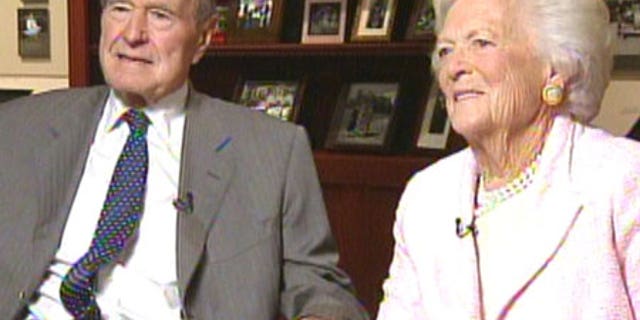
On January 6, 1945, the 20-year-old Bush married 19-year-old Barbara Pierce of Rye, N.Y., whom he had met at a Christmas party three years earlier. They had four sons, George, Jeb, Neil and Marvin, and two daughters, Robin and Dorothy. Robin died of leukemia at age 3.
Following World War II, he enrolled at Yale University, where his first son, George W., was born. Bush graduated Phi Beta Kappa with a degree in economics and was captain of the varsity baseball team.
He and Barbara then moved to Texas where he worked in the oil business
and was elected to two terms in the U.S. House of Representatives. After
losing a campaign for the Senate in 1970, Bush was appointed to a
series of high-level political positions: U.S. Ambassador to the UN,
chairman of the Republican National Committee, Chief of the U.S. Liaison
Office in Beijing and Director of the Central Intelligence Agency.
In 1980 he was elected to the first of two terms as Ronald Reagan's vice president and in 1988 was nominated by the Republicans to carry the party's banner, with Sen. Dan Quayle of Indiana as his running mate, in that year's presidential election.
In 1980 he was elected to the first of two terms as Ronald Reagan's vice president and in 1988 was nominated by the Republicans to carry the party's banner, with Sen. Dan Quayle of Indiana as his running mate, in that year's presidential election.
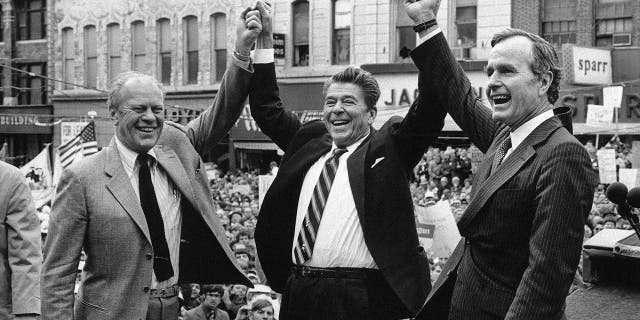
"This is America…a brilliant diversity spread like stars, like a thousand points of light in a broad and peaceful sky," he said in his convention acceptance speech and the "thousand points of light" phrase came to be associated with his administration.
"This is America … a brilliant diversity spread like stars, like a thousand points of light in a broad and peaceful sky."
— Former President George H.W. Bush
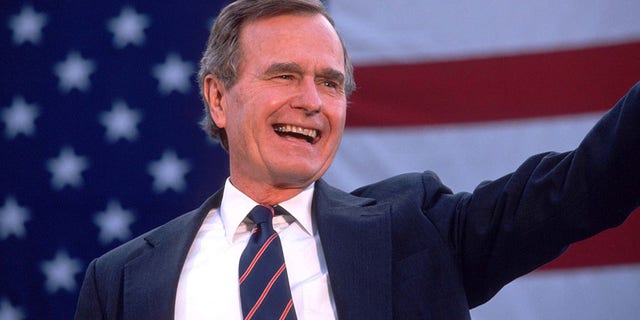
At his Jan. 20, 1989 inauguration following his defeat of Democrat Michael Dukakis, Bush declared "a new breeze is blowing and a world refreshed by freedom seems reborn … the totalitarian era is passing."
And, in fact, the world did dramatically change with the end of the Cold War, the breakup of the Soviet empire and the fall of the Berlin Wall.
But Bush faced new international challenges, as well. In 1989 he sent American troops to Panama to depose that country's leader, Gen. Manuel Noriega, who was returned to the U.S. to stand trial as a drug trafficker. In 1990, he put together a 30-nation coalition to oppose Iraq's invasion of Kuwait and in early 1991 launched Operation Desert Storm, a 100-hour land battle that routed the Iraqi army.
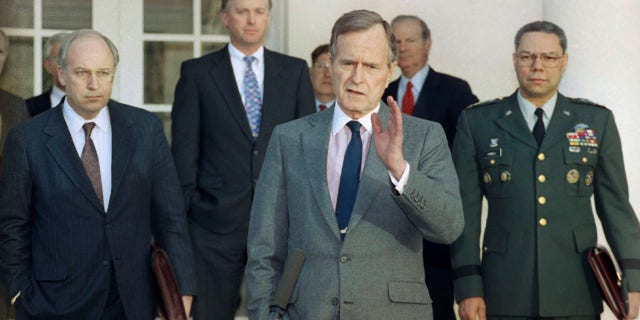
But Bush – who once famously said "Read my lips: no new taxes" -- was faced with economic discontent at home. Trying to reduce the deficit, he signed a bill to raise taxes and also had to deal with failing savings and loans.
On the judicial front, he made two Supreme Court appointments – David Souter in 1990 and Clarence Thomas in 1991.
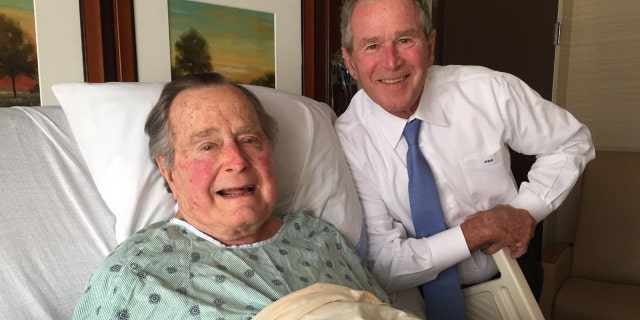
Although occasionally criticized for his lack of eloquence – such as referring to a focus on the larger picture as "the vision thing" – Bush's comments also could be endearingly frank.
Referring to his dislike for a particular vegetable, he once said, "I do not like broccoli. And I haven't liked it since I was a little kid and my mother made me eat it. And I'm President of the United States and I'm not going to eat any more broccoli."
Following his defeat by Bill Clinton in the 1992 election, George and Barbara Bush moved to Houston, where he had long maintained a hotel room as his legal address. They also spent time in Kennebunkport, Maine, where the Bush family has long had a waterside home.
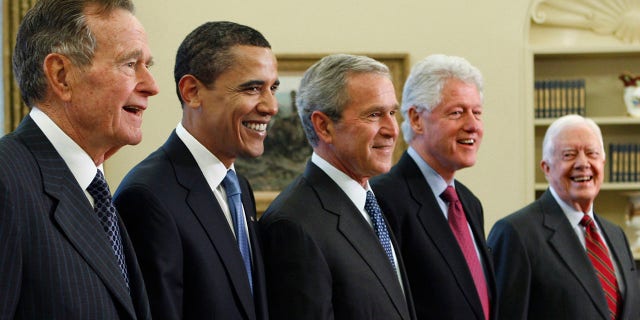
He made appearances on behalf of his son, George W., during his administration and in 2005 joined forces with Bill Clinton, the man who defeated him, to help those devastated by Hurricane Katrina and by the Asian tsunami.
""Because you run against each other, that doesn't mean you're enemies," Bush said at the time, summing up his political philosophy. "Politics doesn't have to be uncivil and nasty."
More recently, Bush joined the four other living ex-presidents in the fall of 2017 for a concert in Texas to benefit victims of hurricanes Harvey, Irma and Maria.
Friday, November 30, 2018
Giuliani calls timing of Mueller’s latest Cohen bombshell ‘hardly coincidental’
Rudy Giuliani, President Trump's personal lawyer, criticized the timing of Michael Cohen's guilty plea on charges of lying to Congress: just before the president was about to leave for a high-stakes G-20 summit in Argentina.
Giuliani issued a statement Thursday saying Mueller's office was proving Trump's former lawyer lied to Congress by using documents that were already voluntarily disclosed by the Trump Organization "because there was nothing to hide."
"It is hardly coincidental that the Special Counsel once again files a charge just as the President is leaving for a meeting with world leaders at the G20 Summit in Argentina," Giuliani said.
Giuliani's statement called out Mueller's office for playing politics with the surprise announcement. Giuliani pointed to a similar decision in July when the Department of Justice announced that 12 Russian intelligence officers were to be indicted for allegedly hacking the Democratic National Committee and others.
The July indictment was announced days before Trump was slated to hold a key summit with Russian President Vladimir Putin in Helsinki. Trump was meeting with Queen Elizabeth II in Britain at the time of the announcement.
Politico spoke to White House officials who hoped the G-20 summit would showcase Trump's ability to negotiate. Trump's upcoming Saturday lunch with China's President Xi Jinping is seen by some to be a make-or-break meeting between the two leaders. Trump also called off a meeting with Putin over the recent naval clash with Ukraine.
Cohen confessed in a surprise guilty plea Thursday that he lied to Congress about a Moscow real estate deal he pursued on Trump’s behalf during the heat of the 2016 campaign for the Republican presidential nomination. He said he lied to be consistent with Trump’s "political messaging."
GREGG JARRETT: COHEN GUILTY PLEA DOES ABSOLUTELY NOTHING TO SHOW WRONGDOING BY TRUMP
The agreement made clear that prosecutors believe Trump's former lawyer was continuing to pursue the Trump Tower Moscow project weeks after his boss had clinched the Republican nomination for president and well after the point that Cohen has publicly acknowledged.
According to a report by BuzzFeed News, Trump’s company planned to give the tower's penthouse to Putin as they worked on a real estate deal for the building during the 2016 campaign. The claim was sourced by four people, including one of the plan’s creators.
But the plan would have been a “stupid idea,” the source told Fox News on Thursday night, adding that the president “never heard of it.”
Fox News is told Trump's legal team was unaware of such a plan.
Plans for constructing the building were ultimately scrapped.
There is no clear link in the court filings between Cohen’s lies and Mueller’s central question of whether the Trump campaign colluded with Russia. And nothing said in court, or in associated court filings, addressed whether Trump or his aides had directed Cohen to mislead Congress.
Giuliani told CNN that "neither of the two versions from Michael Cohen creates a problem for what the president testified."
Subscribe to:
Posts (Atom)
-
Tit for Tat ? ROCHESTER, N.Y. (AP) — A statue of abolitionist Frederick Douglass was ripped from its base in Rochester on the an...
-
NEW YORK (AP) — As New York City faced one of its darkest days with the death toll from the coronavirus surging past 4,000 — more th...




















